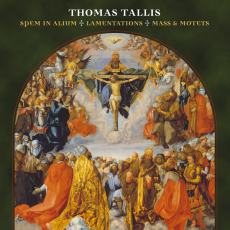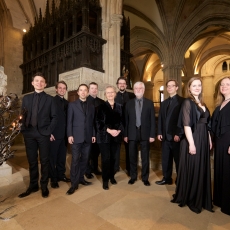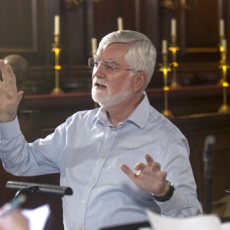Magnificat - Tallis - Atlanta Audio Society
Thomas Tallis (1505-1585), considered by many the "father of English church music," lived in turbulent religious and political times. He learned to trim his sails to ride out the various blasts of Protestant versus Catholic sectarian strife, and in the process he taught the same knack to his pupil and successor, William Byrd. Through it all, Tallis remained a devout Catholic, even during the periods when English Catholics were forced to practice their faith in secret. It should therefore come as no surprise to learn that the Latin liturgy brought out the very best in this composer.
As they do in Spem in Alium, an SACD program of spiritual beauty and nuance by the á capella choir Magnificat under the direction of Philip Cave. The program begins with the intimate and lovely Compline hymn Te lucis ante terminum (Before the ending of the day, Creator of the World), which breathes the air of deepest peace and serenity. Included also among the shorter selections are two settings of Lamentations of Jeremiah (which were especially meaningful to the Catholics of Tallis' day as they ended with the words "Jerusalem, Jerusalem, convertere ad Dominum Deum tuum," Jerusalem, return to the Lord thy God), a brief but dignified Miserere (Lord, have mercy upon us), and the altogether remarkable 40-part setting of Spem in alium (I have never placed my hope in any other).
The last-named work lays out its forty parts as eight five-part choirs, consisting of soprano, alto, tenor, baritone, and bass. The remarkable pattern of beats that emerges, 44 in the initial passage alone, places the greatest demands on the members of Magnificat in terms of perfect intonation and pitch, and on the director for maintaining an ideal balance of all eight choirs as the "stereophonic" effect of this remarkable work moves back and forth. (Really, there is nothing quite like Spem in alium in all the rich English repertoire of this period.)
The program concludes with a Mass for four voices. Restrained and dignified, this work has suffered neglect in comparison with Byrd's own more overtly expressive and dramatic four-part setting of the Mass. But Cave and Magnificat make out a persuasive case for the eloquence of this work in which Tallis derives contrapuntal effects very economically through his part leading. In its simplicity of feeling, it sounds like a perfect jewel in the present recording.


